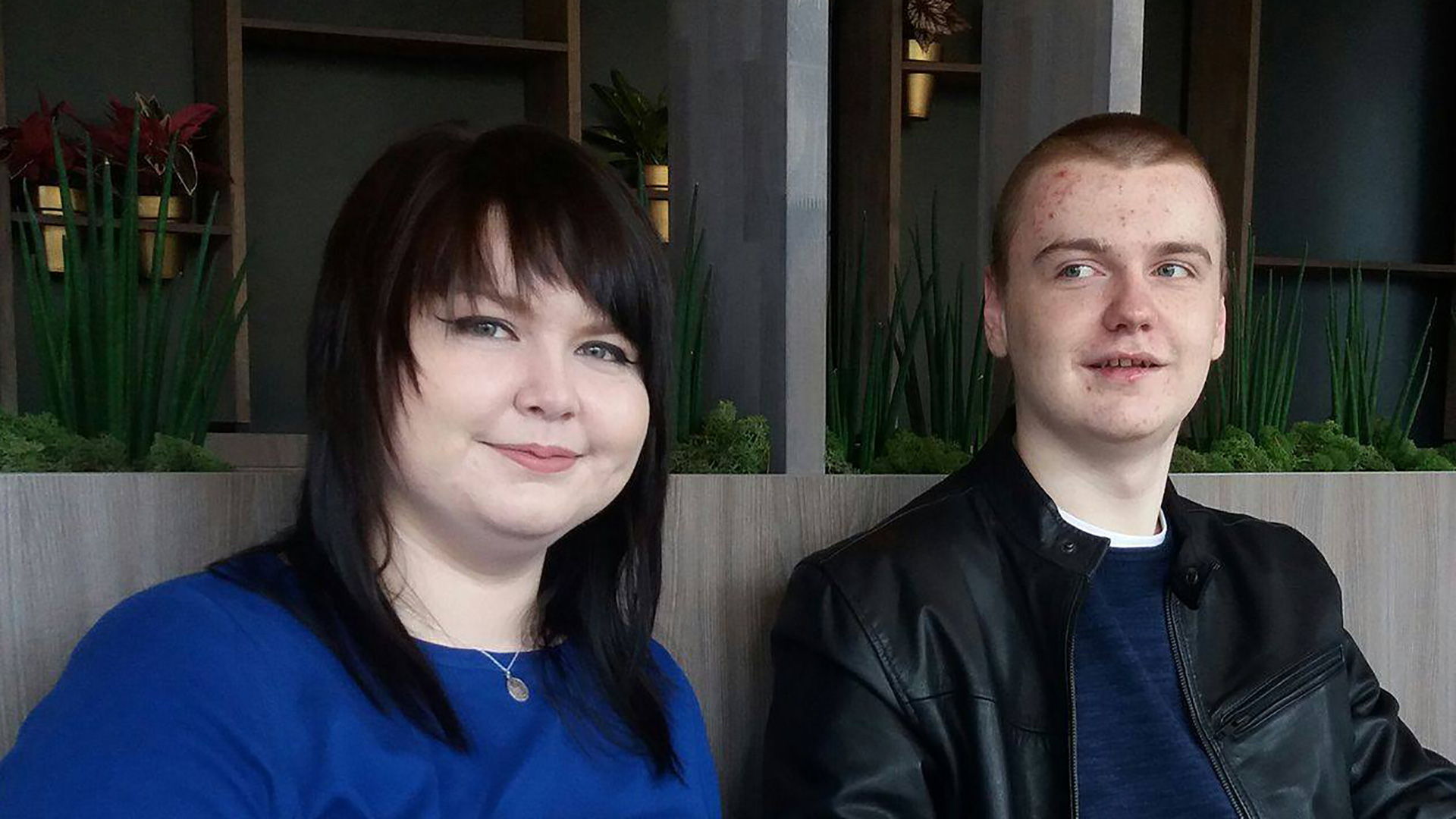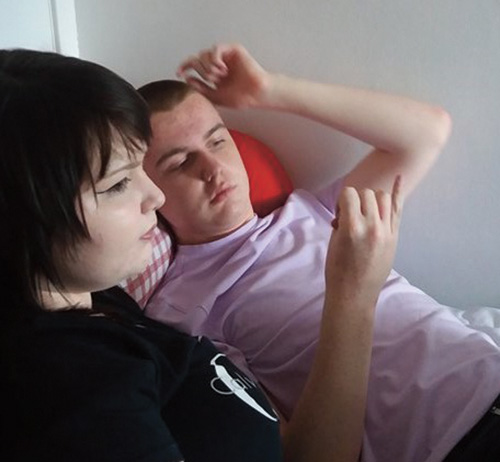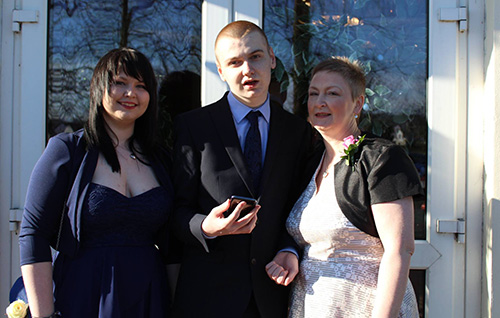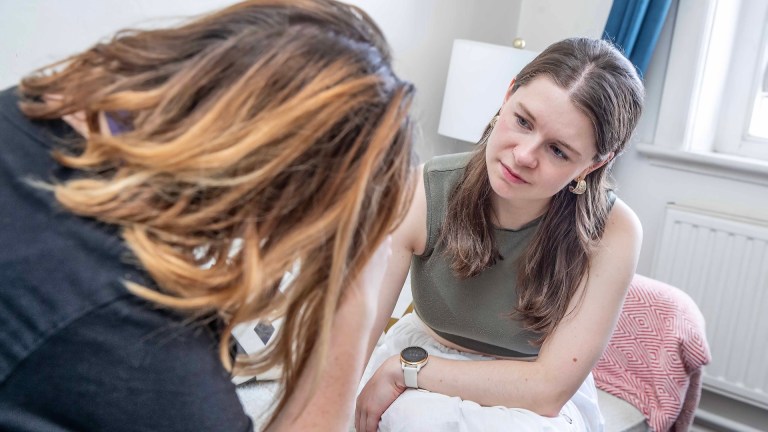One of the biggest issues we face is understanding. Yes, we appreciate that not everyone is exposed to the reality of autism, and the effects it has on processing the surrounding environment. We realise that there will be people who stare, not to offend, but through genuine confusion or curiosity.
But today’s generation can be a ruthless, unforgiving one.
When it all gets too much, sometimes my brother will start to raise his voice, cover his ears, and perhaps flap his hands. To us, this is completely normal, albeit a warning sign that perhaps we should make a move.
Nine times out of 10, we receive a glare of disapproval
To the older couple a few tables away, this is strange, perhaps even ‘unwanted’ behaviour, and nine times out of 10, we receive a glare of disapproval. How dare we, a family under increasing pressure to lead as ‘normal’ a life as possible, interrupt their dining?
And to the group of teenage boys across the room, we are tonight’s entertainment. When my brother finds it too much to bear, he often covers his ears, stares straight ahead, gazes transfixed upon an invisible target in the distance, and emits a long, low sound, trying to block out the background noise.
Ever since my time in primary school, I have always faced the dilemma of how best to react to these situations. Sometimes, you’ll be fighting the urge to snap, to engage in full-on, almost feral confrontation, to tear these people apart and wipe their smug grins from their faces.
In other situations, you’ll reluctantly settle for biting your tongue, clenching a fist, and following behind your family, as the sniggering and snide comments begin. If not for the preference of avoiding a lengthy jail sentence, then for the sake of your parents, who are already pacing anxiously ahead.
It is often in the aftermath that the doubt and over-thinking begins. It leads us down the darkest of paths, into the instability of our conscience. You’ll pick apart every little part of your existence, your daily routine, your reactions, your relationships. Everyone else you know has it so easy.
The impossibilities are endless. Right throughout your childhood, you couldn’t have sleepovers because your brother might not sleep through the night. Friends would tend not to come over, and when they did, they often sat in unease in the corner, staring as he played with a battered Thomas the Tank Engine playset at the age of 13.
Autism is a developmental disability, affecting the way people observe the world and experience interactions with others. It’s not a disease – there is no cure but it’s known as a spectrum condition, meaning that everyone diagnosed will share common difficulties but having autism will affect them all differently. There are around 700,000 people in the UK with autism, which is more than one in 100. To a person with autism, the world can appear overwhelming and social cues can be difficult to read. You can help by speaking clearly, and giving the person time to process what you’ve said.
Family holidays abroad were impossible because your brother didn’t like buses, trains or planes.
Not being able to spend unlimited time with just one parent, being unable to spend those blissful afternoons shopping with your mother, to have those one-on-one counselling sessions about boys, bras and everything under the sun.
Watching as your father would play with your brother, get dressed, go out to work shifts, and then come home and sleep through the day. He was almost nocturnal, and it felt like you never really saw him, which made time together all the more precious.
Not only do I sit in this restaurant and think of what my world is like now but what effects this will have on my future.
One day I will have to step up and take responsibility for the care of my brother
Let me tell you now, I resent my parents for nothing. If anything, I do believe my parents are stronger than most, and I admire them for staying together, staying strong through perhaps the most tumultuous of times.
But I know that one day, I will have to step up and take responsibility for the care of my brother.
It ultimately puts that little bit more pressure on me for a number of factors. For example, I intend on going as far as my education will take me, ideally through four years of university studies. To get into a decent job, with decent pay, to enjoy the years ahead – after all, this life is long and arduous already, without falling into a job I despise.
My parents have already assured me of their full support in this venture, along with my dreams to live and work abroad, my childish fantasies of living on a Tuscan vineyard, or wandering the side streets of Rome and the Vatican City at my own leisure.
Because “you’ll be the only one to get to do this”.
If there wasn’t already a weight on my chest, then this solitary statement was sure to solidify my intentions to make them proud of who I am, that they can sit back a little, knowing that, should the day come where they can no longer care for my brother, I will be there with all I need to give him the comforting life and care he deserves.
Autism can be rather frightening, and I can guarantee you that there are times where I have been afraid of my brother.
For example, how many of these people, relaxing here, sipping their drinks, can say that their siblings endure fits of terrible rage and aggression behind closed doors?
When he struggled to express his emotions through the spoken word, my brother could transition from calm and collected to violent and powerful within seconds.
I could be in my room upstairs, studying, or just trying to unwind after a long day travelling to and from college. And it would begin. Crashing, shouting, screaming.
I would wake up at three in the morning, to see him thrashing against the wall
The sound of your parents, trying desperately to stop him from lashing out, taking hits so that I didn’t have to. Waking up at three in the morning, to see him thrashing against the wall, pounding his head with such force that we feared he may indeed fracture his skull.
Your mother crying, arms black with bruises, her back, arms and chest red from impact, your father, the strongest man you know, struggling to restrain him, he too trying to refrain from crying, taking perhaps the worst of the hits.
Feeling sick to the stomach because in reality, you stand no chance of taking any hits for them.
We needed professional help now. Placed on an infinite waiting list, we could well be destined to live through hell for six to 12 months. However, due to the severity of our situation and family need, we were seen within three months.
It ultimately placed a huge strain on my relationships with others, not least my parents, who were stressed, exhausted and, for a time, distant. The strain this placed on us all was unimaginable. Until over three months later, when we finally received the help we needed.
We were visited by psychologists and social workers, and my brother was given medication to ease his fits. Now, we are able to return to our ‘normal’ lives, and not have to live in fear of him having a meltdown in a public place.
At times, just sitting in this restaurant would have been an unimaginable challenge.
There are times where I catch myself looking at these normal families, with their perfect lives, encapsulated in their own little worlds, untouchable. And I wonder, for the umpteenth time – “I wish I had that…” Then follows the crushing guilt for thinking this way.
It ultimately placed a huge strain on my relationships with others, not least my parents
Then again, would I really change the life I have? Would I really change the way my brother is? Highly unlikely. Although it hurts to know that I might never have the same relationship as the siblings a few tables away, I cannot say I would change the one I have.
After all, how many people can say, at the ages of 17 and 19, that they still receive affectionate hugs and embraces from their younger brother? They have a family which, although pushed to the limit, pushed almost to breaking point, still love one another?
And I smile, sit back, the warmth of my coffee in my palms a reassurance, and I feel like I could take on the world, defy those who judge us based on our differences, with my ‘not-so-normal’ family behind me.
Autism-friendly towns
by Dionne Kennedy
What would it take to make a town autism-friendly? Not much, really. People on the spectrum and their families only seek somewhere where they feel cared for, supported and welcome.
The basis of an autism-friendly town is understanding. The National Autistic Society (NAS) has been working with towns and regions across the UK to identify how communities can make themselves more autism-friendly. Working with Aberdeenshire, Aylesbury and Bath, the charity educates businesses and facilities on how they can transform their services and promote understanding.
People on the spectrum and their families only seek somewhere where they feel cared for, supported and welcome
Cities can be difficult to navigate for people with autism – bright lights, background music and messy shops can trigger sensory overload or ‘meltdowns’. Simple, inexpensive adjustments go a long way to helping make a trip to the shops simpler for someone with autism. Becoming autism-friendly could be as simple as keeping the music down in your store, identifying a quiet space or just being understanding about a meltdown.
From Aberdeen to Windsor, there are 26 buildings in the UK that hold the NAS Autism Friendly Award. This includes the Welsh and Northern Irish Assemblies, and the Scottish Parliament – all of which met stringent criteria to receive the award.
The award rests on knowledge and understanding from everyone in the business about the spectrum, as well as having a flexible attitude – want to see what your dinner looks like before you get there? No problem. Can’t deal with lifts? No problem.
Cities can be difficult to navigate for people with autism
Cinemas across the country offer autism-friendly screenings – with Glasgow Film Theatre (above) becoming the first UK cinema to scoop the NAS Autism Friendly Award for its work with children and adults with autism. That means no ‘shushing’ if it gets a bit too noisy and no bums-on-seats policies.
Several Intu shopping centres also offer autism-friendly shopping hours, allowing families to visit during quieter periods – these include Glasgow’s Braehead, Manchester’s Trafford Centre (above) and Newcastle’s Metrocentre. The shopping giant plans to roll out their autism-friendly environments across all of their centres. Find out more about autism services in your area.
Fancy helping your town become autism-friendly? Email autism.access@nas.org.uk. More help and advice is available from The National Autistic Society. Their free helpline is 0800 800 4104













